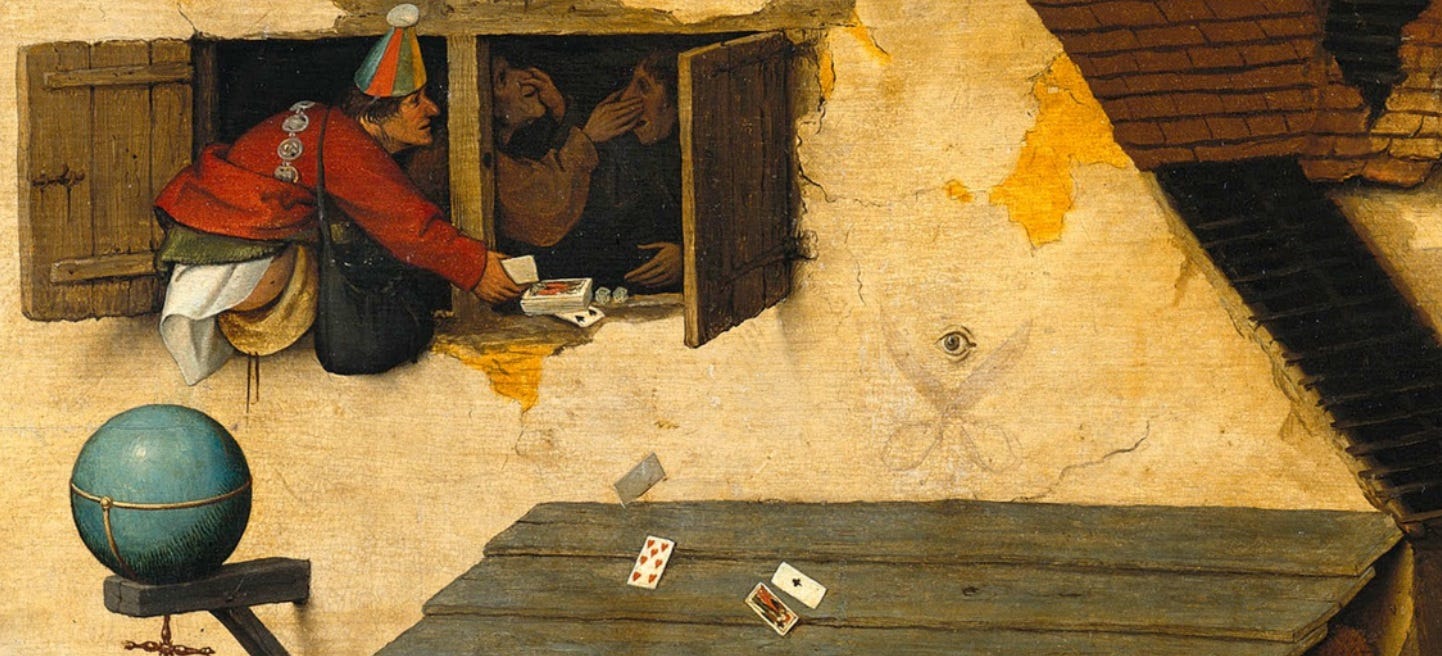Hello,
1.
We all know which ones I mean, right? I don’t have to specify. Of course, it doesn’t seem especially fair that ~4% of the world population is the only ones allowed to vote for its de facto leader, but we haven’t come up with a better system yet. The rest of us suckers can just look at the polls and predictions and bite our nails.
And this is exactly what I want to talk about today, namely, understanding probabilities and predictions. I even have some dubious qualifications to do it this time: in my job as a scientist, I work with experimental data, have to analyze it, and draw conclusions that have consequences. And what I have learned so far is this: don’t put too much stock in the probability calculation of a single event.
This is why scientists make a lot of experiments; statistics makes sense only with a large enough sample size. But with a single event, it is psychologically misleading. Very often, we read that candidate X will win with the probability of 60%, our brain immediately translates it into “candidate X will more likely win than lose”, then into “candidate X will likely win”, then into “candidate X will win”. And when they don’t win, disappointment hits. This is pretty much what happened the time before last. Moreover, in the elections, it is even more misleading because “candidate X will win with the probability of 60%” in our minds can be easily misconstrued as “candidate X will win with 60% of the votes”.
Keep in mind that the statement “candidate X will win with the probability of 60%” is also completely unfalsifiable in this case: there is no course of events that can prove it wrong. If the candidate wins, it was correct. If the candidate loses, well, there were a whole 40% of that happening, so it was still correct. People who make these predictions have great jobs, is what I’m saying.
2.
This is a lesson I actually learned way before I became a scientist. I read it as a kid in a book called “Amusing Mathematics”, written in 1927 by Yakov Perelman, one of the first science popularizers in the world. The book contains short stories; each one illustrates a single mathematical concept. This is the one I remembered the best. Keep in mind, this was written almost a hundred years ago for children, so cut it some slack for the spoon-feeding of basic concepts.
In the dining room of the guest house, during lunch, the conversation turned to how the probability of events is estimated. A young mathematician, who was among the diners, took out a coin and said:
"I'll throw a coin on the table without looking. What is the probability that it will land heads up?"
"First, explain what 'probability' means," voices called out. "Not everyone understands."
"Oh, it's very simple! The coin can land on the table in two ways: like this—heads up, and like this—tails up. There are only two possible outcomes here. Of these, only one is favorable for the event we're interested in. The fraction 1/2 represents the 'probability' that the coin will land heads up."
"Is it really possible to calculate probability in all cases?" asked one of the people at the table. "Take this example: I bet that the first passerby we see from the dining room window will be a man. What is the probability that I'm right?"
"The probability is obviously half, provided that we agree to count a one-year-old boy as a man. The number of men in the world is equal to the number of women."
"And what is the probability that the first two passersby will both be men?" asked another person.
"This calculation is slightly more complicated. Let's list the possible outcomes. First, it is possible that both passersby will be men. Second, a man might appear first, followed by a woman. Third, the reverse: a woman might appear first, then a man. And finally, the fourth possibility: both passersby are women. So, there are 4 possible outcomes. Of these, only the first one is favorable. The probability, then, is represented by the fraction 1/4. Your problem is solved."
"What about a dozen passersby?"
"You mean, what is the probability that the first twelve people who pass by the window will all be men? Let's calculate how large the product of twelve halves is. That's 1/4096, less than one four-thousandth. So, if you're betting that this will happen and you put down 1 ruble, I can bet 1000 rubles that it won't happen."
"That's a profitable bet!" someone exclaimed. "I'd gladly put down a ruble for the chance to win a thousand."
"But there are a thousand chances against your one, keep that in mind."
"It doesn't matter. I'd risk a ruble against a thousand even if it meant betting that a hundred passersby would all be men."
"Do you realize how small the probability of that happening is?" asked the mathematician.
"One in a million or something like that?"
"Incomparably smaller! One in a million would be for 20 passersby. For a hundred passersby, we'd have... Let me estimate on a piece of paper. A billionth... A trillionth... A quadrillionth... Wow! A one followed by thirty zeros!"
"Is that all?"
"Thirty zeros aren't enough for you? The ocean doesn't contain even a thousandth of that number of tiny droplets."
"Impressive number, no doubt! So how much would you bet against my ruble?"
"Haha! Everything! Everything I have."
"Everything is too much. Bet your bicycle. You wouldn't dare?"
"Why not? Sure! Let it be my bicycle, if you like. I'm not risking anything."
"And I'm not risking much. One ruble isn't a large amount. But I could win a bicycle, while you get almost nothing."
"But understand that you are bound to lose! You'll never get the bicycle, and I can practically say that your ruble is already in my pocket."
"What are you doing?" a friend tried to restrain the mathematician. "You're risking a bicycle over a ruble. Madness!"
"On the contrary," the mathematician replied, "it's madness to bet even one ruble under these conditions. It's a guaranteed loss! You might as well just throw the ruble away."
"But there's still one chance, right?"
"One drop in the whole ocean. In ten oceans! That's your chance. And for me, ten oceans against one drop. My win is as certain as two plus two equals four."
"You're getting carried away, young man," came the calm voice of an old man who had been silently listening to the argument the whole time. "You're getting carried away..."
"What? You, professor, are on their side?"
"Have you considered that not all cases are equally likely here? Probability calculation is only valid for which events? For equally likely ones, isn't that so? But in the example under consideration... However," the old man said, listening intently, "reality itself seems to be about to clarify your mistake. You can hear a marching drum, can't you?"
"What does music have to do with it?" the young mathematician began to say, but stopped short. His face expressed fear. He jumped up, rushed to the window, and stuck his head out.
"Just as I thought!" his gloomy voice rang out. "The bet is lost! Goodbye, my bicycle..."
In a minute, everyone understood what was going on. A battalion of soldiers was marching past the windows.
— “Amusing Mathematics”, Yakov Perelman
3.
Wait, but what about predictors with a good track record, you may ask. What about people who were right for the last whatever times? Surely, they must know better.
Let alone that some of the past elections were actually fairly easy to predict. Let alone that this is casualistic thinking, and David Hume would be very cross with you. I’d just like to remind you that there was an octopus who correctly predicted the outcome of eight out of eight games in the 2010 FIFA World Cup. I will share my favorite quote from the Wiki article linked above:
Some other German oracles did not fare so well in the World Cup. The animals at the Chemnitz Zoo were wrong on all of Germany's group-stage games, with Leon the porcupine picking Australia, Petty the pygmy hippopotamus spurning Germany's apple-topped pile of hay (instead of Serbia), and Anton the tamarin eating a raisin representing Ghana.
Mani the parakeet of Singapore became famous for correctly predicting the results of all four quarter-final matches. Mani contradicted Paul by picking the Netherlands to win the final, resulting in some media outlets describing the game as an "octopus-versus-parakeet showdown".
Rabio the Octopus who correctly predicted the results of all of Japan’s group stage games at the 2018 FIFA World Cup, was killed and sent to market, on 2 July 2018 by the Japanese fisherman who had caught it.
I believe even some of the most successful predictors out there may eventually go the way of Rabio the Octopus. Metaphorically speaking, of course.
A lot of things can happen before and on the very day of the election. Some people who wanted to vote can fall sick. Some people who were not sure they were going to vote change their mind. Some people in the voting booth see the names of the candidates and are overwhelmed with a feeling of dread and hatred for either, and a little bit with a desire to puke. Some people go and vote just for spite. Some people change their vote at the last second after a hearty talk with their taxi driver. Multiply this by the 300 million voters, and in a race this close, you’ll inevitably get a mess.
We have to accept that events like an election (in a proper country, that is) are often children of random. One of the threads in the tapestry of history is chaos. Fortune tellers, augurs, and election predictors make it seem like it’s not, like things like that can be known in advance, but it is, and they cannot.
There is fear, but there is beauty in it too. Relax and enjoy the shitty ride with the rest of the world.
Here’s a weird-ass medieval marine unicorn to guide you.
This essay was written for the Soaring Twenties Social Club (STSC) Symposium. The STSC is a small, exclusive online speakeasy where a dauntless band of raconteurs, writers, artists, philosophers, flaneurs, musicians, idlers, and bohemians share ideas and companionship. Each month, STSC members share something around a set theme. This cycle, the theme was “The E_ection Special”.
If you are a writer, you might consider joining us.
Best,
Ꙝ








> Keep in mind that the statement “candidate X will win with the probability of 60%” is also completely unfalsifiable in this case: there is no course of events that can prove it wrong.
Forecasters use the Brier score to translate these to a quantifiable track record of how well a model/a person predicts election outcomes. In this case 60% would be the confidence of the model.
If there is a systematic predictor (ie algorithm), the hypothesis is that the model can predict outcomes with a certain precision and therefore with multiple elections it could be falsifiable.
The Signal and the Noise by Nate Silver is an excellent book on this.
That's why I'm so often right, if not to say "almost always" lol
but no, really, -Thank you, that was a delightful read
(not sure about "de-facto leader, but okay. Let's assume))